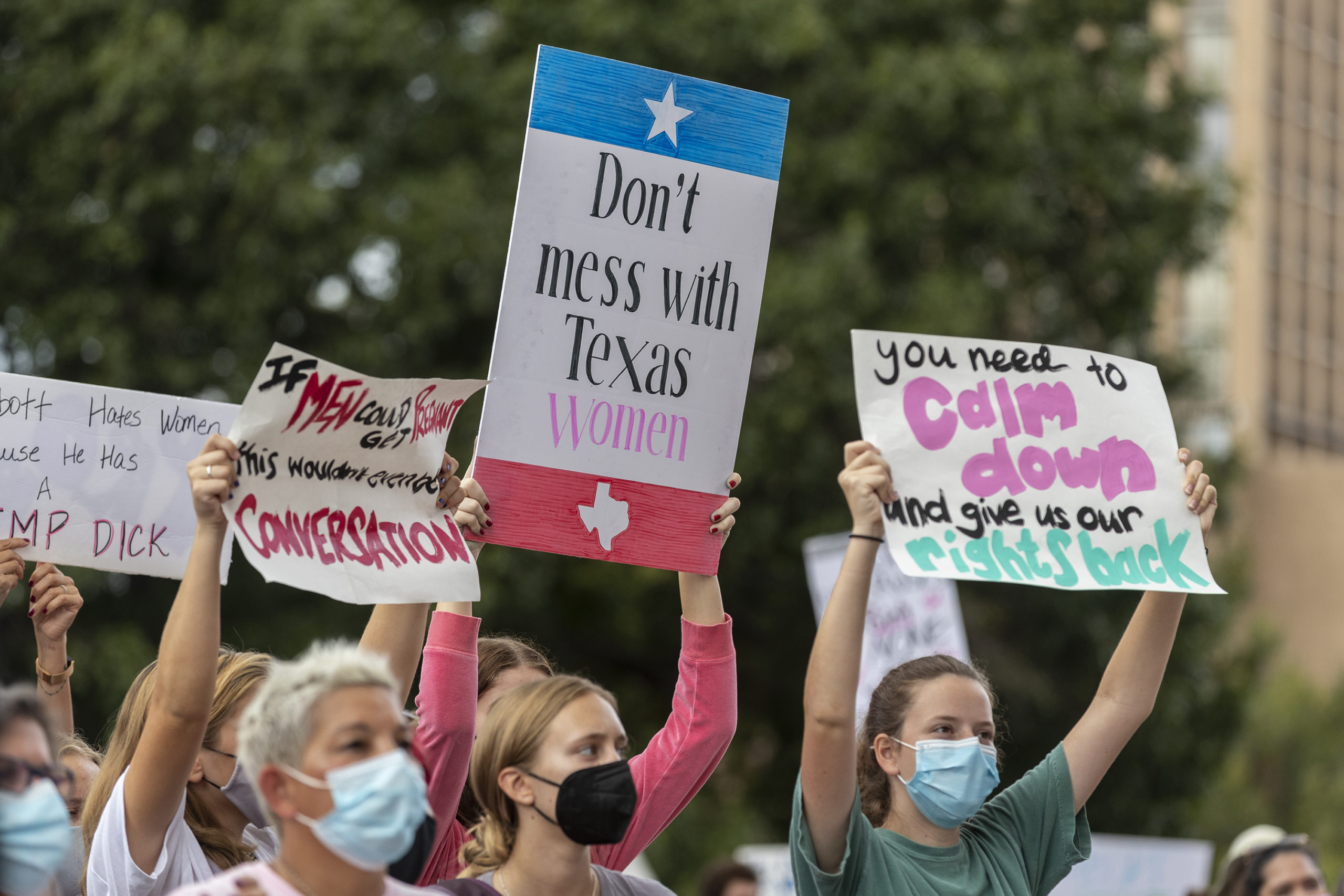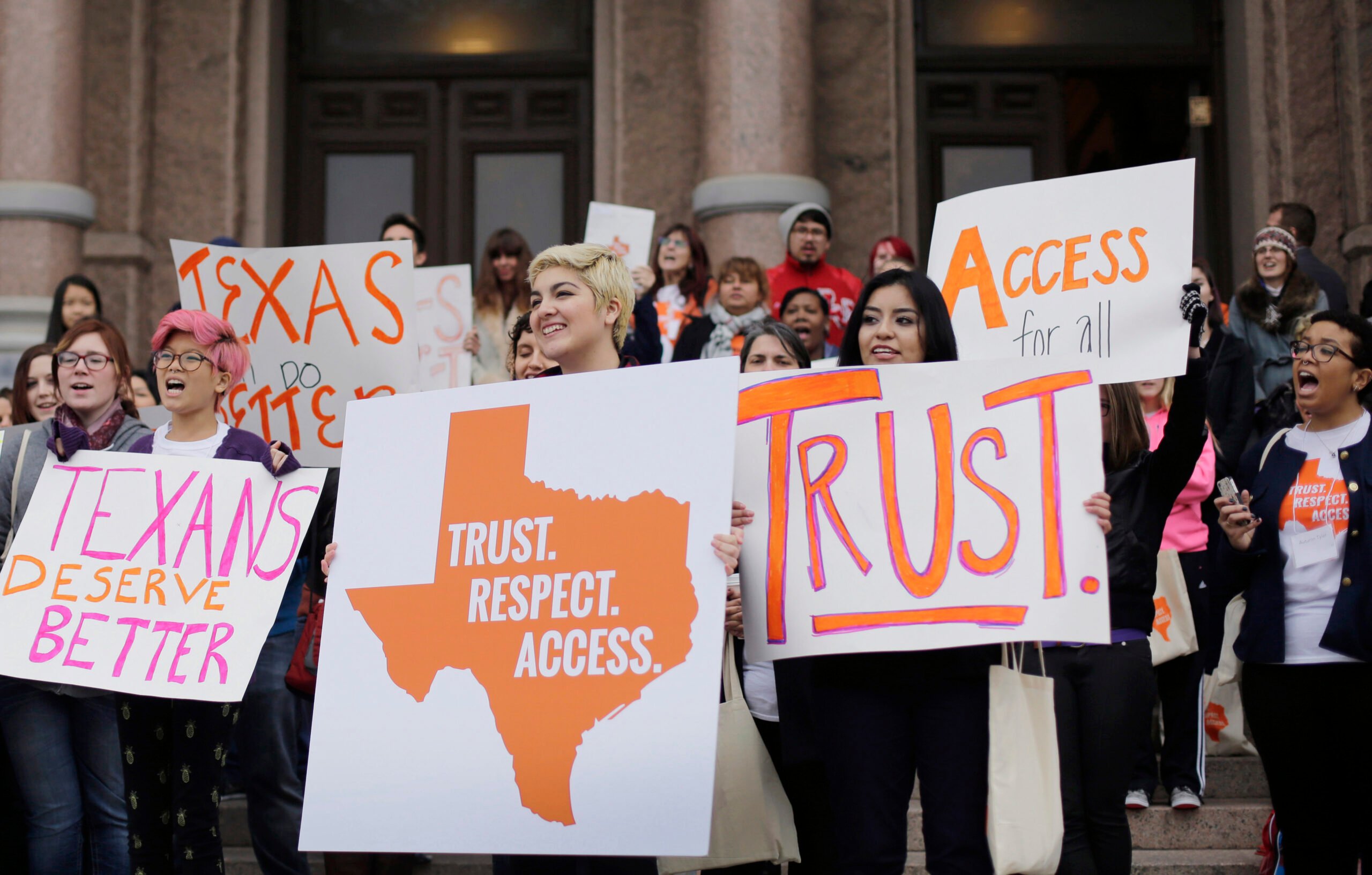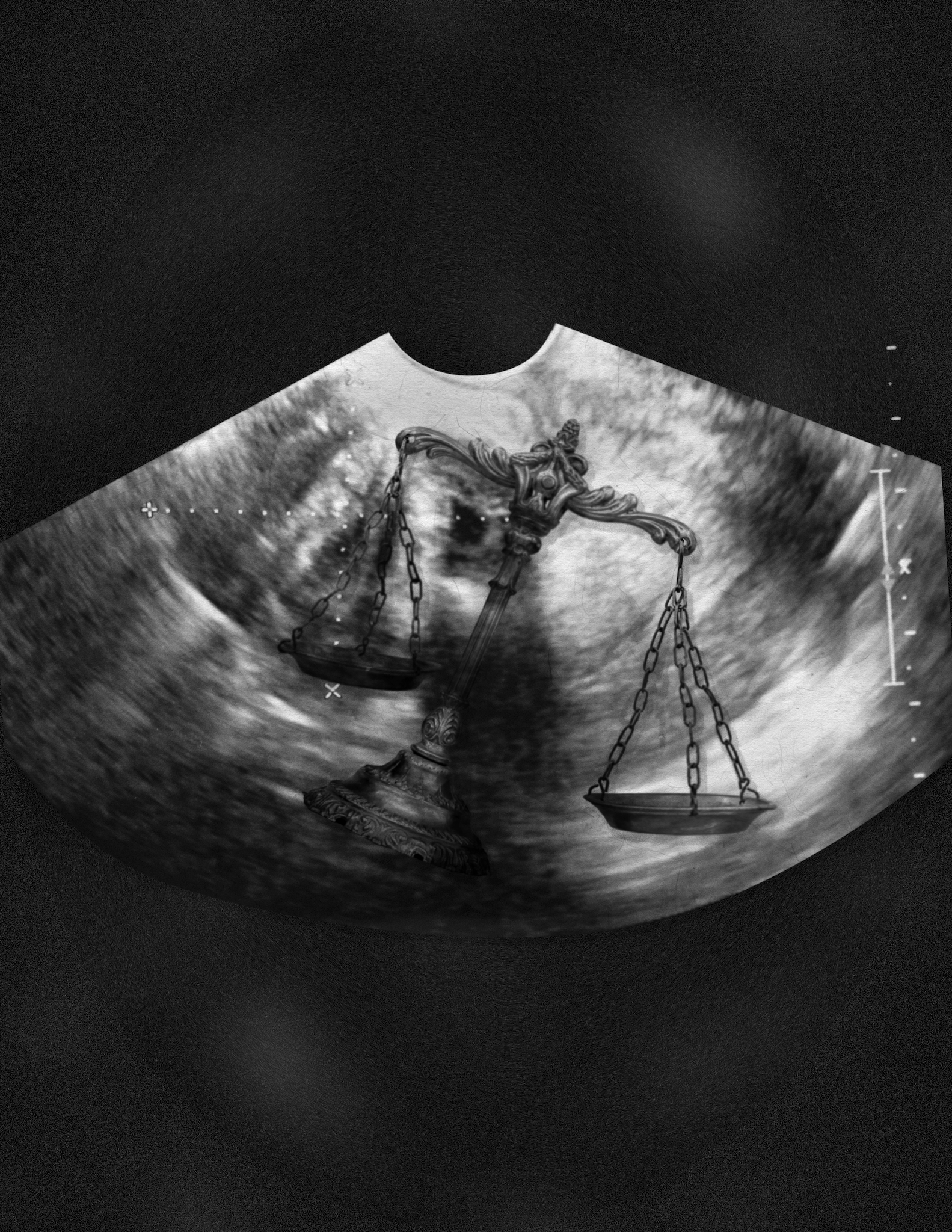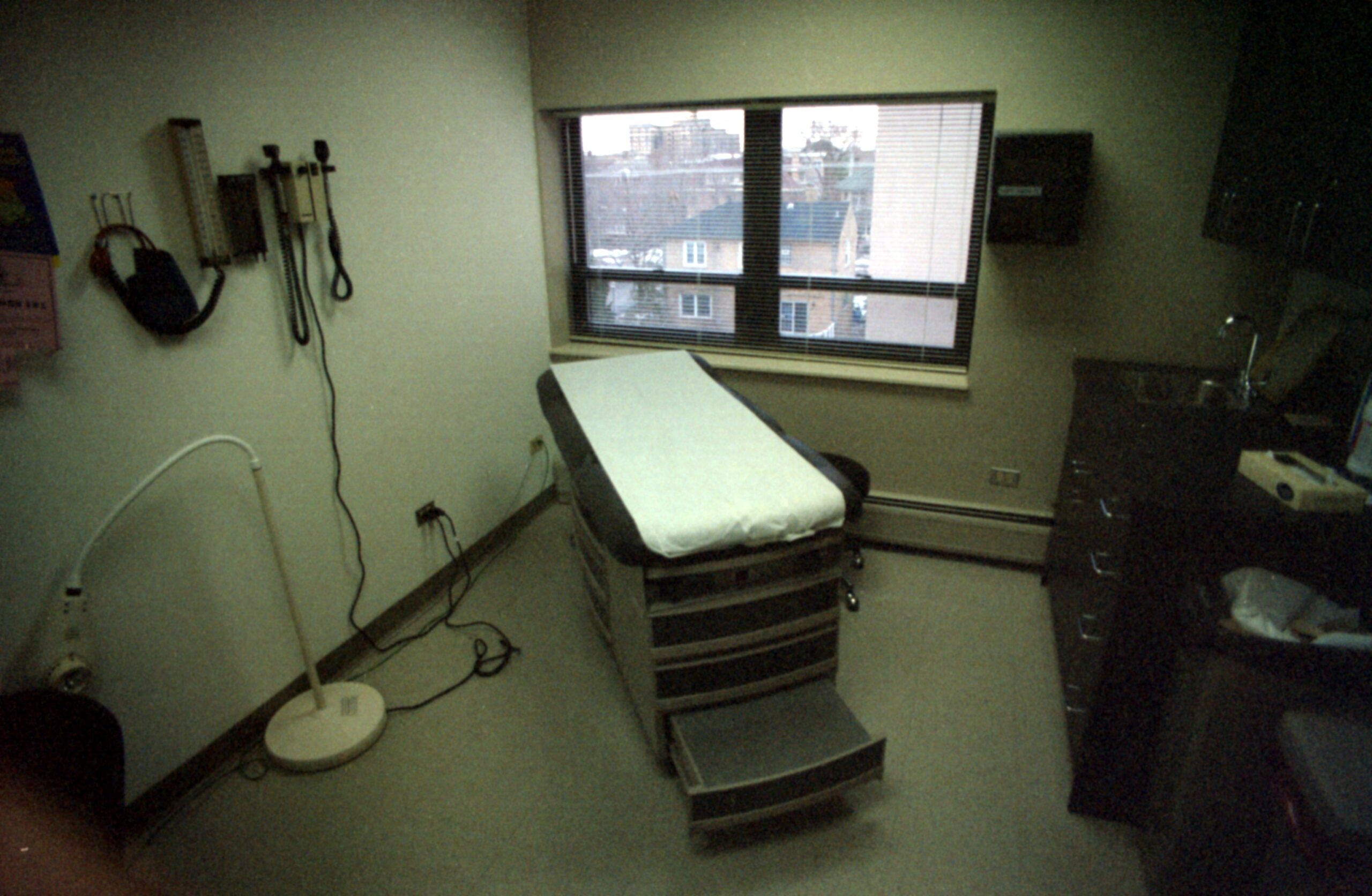
Long Before the Near-Total Ban, Texas Was Home to the Most ‘Abortion Deserts’ in the U.S.

This story was produced in collaboration with Public Health Watch.
When Kristen Holcomb faced an unplanned pregnancy in 2017, she felt isolated, scared and confused. The anxiety didn’t stem from grappling with whether to terminate her pregnancy – she was resolute in her decision to do so. Rather, it came from how she could access abortion care. Lubbock, the West Texas city in which she lived, wasn’t home to an abortion provider. In fact, the entirety of West Texas and the Panhandle – a large swath of the state – had no abortion clinic.
Following the passage of Texas House Bill 2 (HB 2), a 2013 multi-part state law that forced clinics to comply with medically unnecessary and costly regulations, the sole abortion clinic in Lubbock, a Planned Parenthood health care center, closed its doors. It wasn’t alone – half of the state’s abortion clinics also shut down after the so-called TRAP (Targeted Regulation of Abortion Provider) law took effect, slicing the number of clinics from about 40 to fewer than 20 for the state’s 5.4 million reproductive-age women, adding substantial driving distance to the nearest clinic.
Even after the U.S. Supreme Court struck down part of the law in its historic Whole Woman’s Health v. Hellerstedt ruling in 2016, finding it overly burdensome, the clinic remained shuttered for years, as did most others that closed as a result of the law. Limited mostly to metropolitan areas like Houston, Austin, Dallas and San Antonio, abortion services were absent from 96% of Texas counties.
While the Lubbock clinic re-opened and resumed abortion services in April, it was quickly forced to halt abortion procedures in June, just two months after anti-abortion activists successfully launched a campaign to turn the city into a “sanctuary for the unborn.”
Holcomb’s closest option was in New Mexico. As a graduate student and staff member at a state university, she had few financial resources to make the trip to Albuquerque and struggled to come up with the money before connecting with an abortion-assistance group, the Texas Equal Access Fund, which helped pay for her hotel room and gas. Holcomb was forced to take time off work and drive six hours – about 400 miles each way – to her abortion appointment. She was met with anti-abortion protesters gathered near the clinic who harangued her with diatribes such as “abortion is murder.” The experience, she said, was “exhausting and overwhelming.”
“It was infuriating to know I couldn’t get this health care procedure that is supposed to be a constitutionally protected right in my own community,” Holcomb said. “I thought, what if I have complications or need additional care after this? There was nowhere to go back home in Lubbock.”
Holcomb’s dispiriting experience has been the norm in Texas since Senate Bill 8 – a near-total abortion ban – went into effect Sept. 1 following the Supreme Court’s 5-4 decision to not block the measure. While federal Judge Robert Pitman paused the law on Oct. 6 at the request of a legal challenge from the U.S. Department of Justice, the 5th Circuit Court of Appeals restored the measure 48 hours later at the behest of Texas officials. On Monday, the Justice Department asked the Supreme Court to halt the law; the high court also agreed to quickly consider taking up a similar legal challenge against SB 8, this one from Texas abortion providers.
Signed into law by Gov. Greg Abbott in May, SB 8 bars abortion care once embryonic fetal cardiac activity is detected — typically around six weeks — with no exception for rape or incest. As most women aren’t aware they are pregnant this early on, it has amounted to a ban for 80% of abortion-seeking Texans in the second-largest state in the U.S. Patients’ driving distance to the nearest abortion clinic is estimated to have increased 14-fold, from an average of 17 miles to 247 miles each way, according to the Guttmacher Institute, a reproductive health policy group. Rather than leaving it up to the state to enforce, the law empowers any private citizen to sue an abortion provider or someone who “aids or abets” abortion care – a novel provision born of what some call a “dangerous” legal strategy. SB 8 is widely considered the most extreme abortion ban in the U.S. since the Supreme Court guaranteed the constitutional right to abortion care under Roe v. Wade in 1973.
For women like Holcomb, however, it didn’t take SB 8 to push such care out of reach: Even with Roe intact the right to abortion access already felt meaningless to Texans who faced years of state-imposed barriers to care.
“We have learned time and time again the legal right to abortion care does not mean you can access the care that you need,” said Kamyon Conner, executive director of the Texas Equal Access Fund, a nonprofit that funds abortion for low-income people in North Texas. “SB 8 went into effect September 1, but abortion access has been under attack in Texas for a long time. Throughout the last decade, the Texas legislature has passed many racist, classist, and dangerous abortion restrictions that have made it very difficult to access care. This ban is the latest in a long series of draconian restrictions that harm Texas families.”
Leaders at abortion funds – which are on the front lines of helping Texans get abortion care – say that prior to SB 8, many clients were forced to travel up to 300 miles for the procedure and make out-of-state visits. Some had to delay care while others were forced to carry pregnancies to term.
“Make no mistake, abortion care has not been easily accessible in Texas for a very long time,” Zaena Zamora, executive director of Frontera Fund, said during a recent press call. “And now, SB 8 just makes it almost completely inaccessible.”
BARRIERS TO ABORTION CARE
In the U.S., 27 cities are considered “abortion deserts” – where the lack of an abortion clinic forces women to venture at least 100 miles for care. Texas – home to a slew of draconian state restrictions – had 10 of these cities well before SB 8 took effect, giving it the most abortion deserts in the country, according to research from the University of California, San Francisco’s Advancing New Standards in Reproductive Health. The first-of-its-kind study, published in 2018, found that four of the top five abortion deserts — Lubbock, Midland, Odessa and Amarillo — were in Texas. In each, women had to trek up to 300 miles for care.
The dearth of clinics coupled with myriad state-imposed barriers have made abortion care exceedingly difficult in Texas for at least a decade said Kari White, an associate sociology professor and principal investigator with the Texas Policy Evaluation Project at the University of Texas at Austin. The research group has tracked the impacts of state reproductive-health policies since 2011.
“Abortion care in Texas was already an obstacle course for those needing services prior to Senate Bill 8,” White said. “There were huge swaths of the state with no abortion clinic and innumerable hurdles in the path to care, particularly for low-income people and people of color.”
That obstacle course is the result of measures passed by the Republican-dominated Texas Legislature.
Since 2012, they include:
*A mandatory sonogram 24 hours before an abortion with the same physician who is to perform the procedure. This adds a second trip to the doctor’s office, meaning women traveling great distances must find lodging and, in some cases, take time off work and arrange for child care.
*A ban on abortion telemedicine, which forces an in-person visit.
*A ban on abortion care past 20 weeks.
Prior to SB 8 there was already a two- to three-week wait for the first sonogram appointment, said Dr. Ghazaleh Moayedi, a Dallas-based OB/GYN, abortion provider, and a board member of Physicians for Reproductive Health. “We already have restrictions on top of restrictions that delay even the first visit,” she said.
Women must also pay out of pocket – or rely on abortion funds – to finance the procedure, as Texas bans the use of both public and private insurance coverage for abortion.
Texas law has also added hurdles for teenagers seeking judicial bypass — the legal process through which minors obtain abortions without parental consent. And all abortion patients must be given a pamphlet with medically inaccurate information about abortion risks, linking the procedure to breast cancer, for example. Based on these laws, the Guttmacher Institute categorizes Texas as “extremely hostile” to abortion rights.
In addition to SB 8, the Texas Legislature passed a law this year – scheduled to take effect Dec. 2 – that restricts the use of abortion medication to the first seven weeks of pregnancy, even though U.S. Food and Drug Administration guidelines say it can be used safely up to 10 weeks. Lawmakers also passed a measure that would bar abortion care entirely in the event the Supreme Court overturns Roe.
With some of the steepest barriers to care in the U.S, Texas abortion patients try to end their pregnancies on their own at a higher rate than the national average, the Texas Policy Evaluation Project found. Women cited not being able to afford care and shuttered clinics in their communities as the primary reasons for self-managed abortion.
The restrictions in Texas, White said, disproportionately impact low-income women and women of color, who already bear the brunt of health care and socioeconomic barriers. For example, following the passage of HB 2, Latinx patients who needed to travel greater than 100 miles to obtain care saw their abortion rate decrease by 43%. The rate for white patients dropped by only 10%.
Ideologically motivated state lawmakers have also chipped away at the family-planning safety net, defunding preventive care providers like Planned Parenthood while failing to take meaningful action to address the state’s maternal mortality crisis. Texas’ maternal mortality rate — 18.7 deaths per 100,000 live births — lies above the national average of 18.5, with Black women disproportionately affected. A new analysis from Dr. David Eisenberg, an OB-GYN who provides abortions in Missouri and Illinois, estimates that SB 8 will result in a 15% overall increase in maternal mortality and up to a 33% increase for Black women by next year.
A ‘HUMAN RIGHTS DISASTER’
SB 8 has darkened the already-bleak reproductive-health landscape, those on the ground say.
Texas abortion clinics are being forced to turn away hundreds of patients past the six-week mark of their pregnancies, inundating out-of-state clinics and creating a backlog that further delays care. Women from Texas are “traumatized” and “scared” as they “frantically” try to get appointments at overloaded clinics, abortion providers stated in a recent court filing on behalf of the Justice Department’s lawsuit against SB 8. In the first 12 days the law was in effect, a Planned Parenthood clinic in Oklahoma City saw a 646% increase in Texas patients compared to the first six months of the year.
“It is a human rights disaster that people are being forced to travel to New York, Michigan, or even New Mexico for abortion,” Moayedi said. “No person should be forced to travel outside of their communities for health care, ever, but especially during a global pandemic.”
Low-income patients are panicking as they try to find a way to receive time-sensitive care under the law, officials with abortion funds say. Anna Rupani, co-executive director of Fund Texas Choice, tells the story of an abortion-seeking woman who underwent the state-mandated sonogram on Aug. 31, with no embryonic cardiac activity detected. After the one-day waiting period, that changed. The sonogram results prevented her from accessing care in Texas, even after she had taken time off work and traveled 200 miles round-trip. She now must wait three weeks for an appointment 1,000 miles away and take additional time off.
“This is unjust and unfair,” Rupani said. “This barrier should not exist. We were able to help support this client but there are many who will not be able to find child care or time off work.”
Abortion-support groups felt a preview of SB 8’s impact in March 2020, when an executive order by Abbott halted abortion care for roughly one month during the COVID-19 pandemic under the pretense of conserving personal protective equipment. The order resulted in a 38% decrease in abortions at the time and, due to delayed appointments, a 61% increase in riskier, second-trimester procedures once the order expired. The number of Texans who received care from out-of-state facilities grew from 157 in February 2020 to 947 by April 2020.
Research shows that not everyone has the resources to make it out of state for abortion care, said White, of the University of Texas.
“Some may end their pregnancies on their own,” she said. “And we should anticipate seeing more unplanned pregnancies and other significant consequences cascade from there.”
‘ABORTION SAVED MY LIFE’
Anti-abortion activists and Texas state lawmakers often peddle the false narrative that the procedure causes mental-health instability and thoughts of suicide, perpetuating the idea of “postabortion traumatic stress syndrome” – an ostensible disorder not recognized by either the American Psychological Association or the American Psychiatric Association. The former not only refutes the notion but says unwanted pregnancies appear to be strongly associated with poor mental health for women later in life.
Women who are denied abortion care are more likely to experience higher levels of anxiety and lower life satisfaction and self-esteem, according to data from the Turnaway Study, which tracked the five-year trajectories of women who received abortions compared with women who were denied care.
Indeed, Kristen Holcomb’s mental health deteriorated due to the nearly insurmountable hurdles she faced in getting care. She struggled to sleep and found it difficult to concentrate on her work.
“I was so scared that I wasn’t going to be able to get an abortion that it sent me into a deep depression where I actually considered suicide,” she said. “Fortunately, I was uplifted by the support around me from my husband and others and got through an extremely tough situation. Having access [to abortion] potentially saved my life.”
Mary Tuma is a contributing writer for Public Health Watch, a nonprofit, nonpartisan investigative news organization.
People take part in the Women’s March ATX rally on October 2, 2021, at the Texas State Capitol in Austin, Texas. The march was a response to controversial legislation recently passed by Texas lawmakers which has banned most abortions in Texas.



